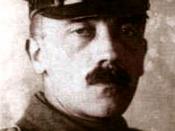In William Shakespeare's Richard III, we see Shakespeare's interpretation of
despot rule and the parallels that stem from this interpretation. The character type of
Richard has been examined and marveled for thousands of years. From Plato's
examination of despot rule in the Republic, we see the motives of what drives despot
rulers. A look at the background of Richard and how his upbringing and personal life
contributed to his insecurities will help to understand why someone may become a
despot. The comparison of Adolf Hitler to that of Richard, shown by the modern
motion picture Richard III, will show the rapid rise and fall of the despot and the reality
of totalitarian rule.
Plato's Republic, a fascinating look at the comparison of the just soul and the
unjust soul, allows one to see the philosophical motives behind despot rule. Despot
rulers are simply driven by fear.
Their anxieties and insecurities lead to a hatred that has
a desire to destroy, deep-rooted in violence. Despot rulers are also never satisfied with
the power they have at any given time, thus exposing their constant fear of retaliation
from their subjects. This examination of the despot ruler by Plato clearly shows the
motives by which despot rulers rule, but it fails to explain why and how these motives
originate in the human mind.
In order to comprehend why such a high level of fear and insecurity can be
brought about, a look at the upbringing and personal life of Richard should be brought
into discussion. One of three brothers, Richard was in constant competition of who
would succeed in gaining the throne of England. Richard, like his other brothers,
wanted the title of king quite badly, but as time pressed on it seemed less likely that
Richard would succeed...



Word Choice
Are you sure that it's desperate and not despot?
3 out of 3 people found this comment useful.